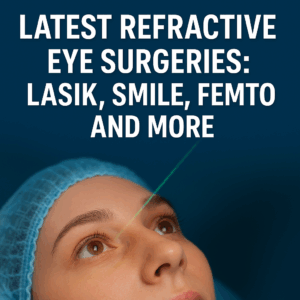
Anushka Super Speciality Eye Hospital
Call: 90044 44422 / 99213 44422 | Timings : 8.30 a.m to 5.30 p.m (Mon-Sat) | Add: Shri Swami Samarth Soc, Kaneri Dhamankar Naka, Bhiwandi




Accredited for Quality Care
First HOTA-Accredited Eye Hospital in Bhiwandi Performs City’s First-Ever Corneal Transplant: A New Vision Begins
anushka
15 July 2025
In a historic medical breakthrough for the city of Bhiwandi, Dr. Anushka Sharma Eye Hospital has proudly performed the first-ever corneal transplant surgery in the region. More than just a surgical milestone, this achievement marks Bhiwandi’s arrival on the national map of advanced ophthalmic care.
As the first and only HOTA-accredited and NABH-certified eye hospital in Bhiwandi, our institution has set new standards in safe, ethical, and world-class eye surgeries—beginning with the restoration of vision through corneal transplantation.
What Is a Corneal Transplant and Why Is It Performed?
The cornea is the eye’s transparent outermost layer, much like a window that lets light enter and focus on the retina. A healthy cornea is essential for clear, sharp vision. However, due to injury, infection, degenerative diseases, or congenital defects, the cornea can become cloudy, scarred, or misshapen—resulting in blurred or complete loss of vision.
A corneal transplant, also known as keratoplasty, involves surgically replacing the damaged cornea with healthy donor tissue. The goal is to restore sight, relieve pain, and in many cases, improve the patient’s quality of life significantly.
Indications: Who Needs a Corneal Transplant?
Not all eye conditions require a transplant. However, in some cases, when vision loss or corneal damage becomes irreversible, a transplant is the only solution.
Common medical indications include:
1. Keratoconus
A degenerative condition where the cornea thins and protrudes into a cone shape, causing distorted vision.
2. Corneal Scars
Scarring due to injury, chemical burns, or severe infections like bacterial or viral keratitis.
3. Fuchs’ Endothelial Dystrophy
A genetic disorder causing the inner cell layer (endothelium) to deteriorate, leading to swelling and hazy vision.
4. Bullous Keratopathy
A painful condition where fluid builds up in the cornea, often after cataract surgery or trauma.
5. Corneal Ulcers or Infectious Keratitis
Non-healing ulcers due to severe infections that permanently damage corneal clarity.
6. Failed Previous Corneal Transplants
A repeat transplant may be necessary if the first graft is rejected or fails over time.
Types of Corneal Transplants
Thanks to technological advancements, corneal transplants today are customized based on the layer affected—minimizing complications and maximizing recovery.
1. Penetrating Keratoplasty (PK)
A full-thickness corneal transplant where all layers of the cornea are replaced. It is typically used in cases involving deep scarring or damage.
2. Deep Anterior Lamellar Keratoplasty (DALK)
This procedure replaces only the front layers of the cornea, leaving the endothelium intact. Ideal for keratoconus and superficial scars, it has a lower rejection risk.
3. Descemet’s Stripping Endothelial Keratoplasty (DSEK)
A partial-thickness transplant where only the damaged inner layers are replaced. This is commonly performed for endothelial dysfunctions like Fuchs’ dystrophy.
4. Descemet’s Membrane Endothelial Keratoplasty (DMEK)
An even more refined version of DSEK, DMEK transplants only the Descemet’s membrane and endothelium, offering quicker recovery, better vision, and minimal complications.
At Dr. Anushka Sharma Eye Hospital, we offer all these advanced techniques, using international best practices and ethical donor tissue sourced through HOTA-approved channels.
Step-by-Step: The Corneal Transplant Procedure
1. Preoperative Assessment
Before recommending a transplant, we conduct a comprehensive eye exam that includes:
- Corneal topography
- Optical coherence tomography (OCT)
- Specular microscopy
- Intraocular pressure check
- Endothelial cell count
We also assess the patient’s general health and suitability for surgery.
2. Surgery Day
The procedure typically takes 30 to 90 minutes and is performed under local or general anesthesia. During surgery:
- The damaged portion of the cornea is removed
- Healthy donor cornea is sutured or implanted depending on technique
- A protective shield is applied
3. Postoperative Care
- Patients are prescribed antibiotic and steroid eye drops
- Frequent follow-up visits are scheduled to monitor healing
- Sutures (in full-thickness transplants) may be removed in 6–12 months
- Vision correction options like glasses or contact lenses are considered after recovery
HOTA Accreditation: What It Means for You
HOTA stands for the Human Organ Transplant Act, which governs organ and tissue transplantation in India. Only HOTA-authorized institutions are legally permitted to:
- Procure donor tissues (corneas)
- Perform transplants
- Register on the official waiting list
Being HOTA-certified ensures that every transplant at our hospital is ethically and legally compliant, sourced from voluntary eye donations and handled by trained transplant coordinators.
Dr. Anushka Sharma Eye Hospital is Bhiwandi’s first and only HOTA-authorized eye hospital, giving our community access to ethical and regulated eye transplant services locally.
NABH Accreditation: Benchmark for Quality Care
Our hospital is also NABH-accredited (National Accreditation Board for Hospitals & Healthcare Providers), reflecting excellence in:
- Patient safety
- Clean surgical environments
- Staff training and emergency preparedness
- Transparent clinical processes
NABH is the highest recognition for healthcare institutions in India, and we are proud to be the first eye care facility in Bhiwandi to receive this honor.
Why This Matters to You
Until now, patients from Bhiwandi needing corneal transplants had to travel to cities like Mumbai or Thane. That meant delays, added expenses, and logistical difficulties.
But now, with a HOTA-approved, NABH-accredited, and technologically advanced eye hospital in your own city, you get:
- Top-tier care without leaving Bhiwandi
- Shorter waiting times
- Affordable packages
- Expert surgical team trained in advanced corneal procedures
We have brought vision-saving surgery to your neighborhood, eliminating the barriers of distance and cost.
Eye Donation: Be the Reason Someone Sees
Corneal transplant is only possible because of eye donation. When a person pledges their eyes and passes away, their corneas can restore vision in two blind individuals.
At Dr. Anushka Sharma Eye Hospital, we actively:
- Educate the public on the importance of eye donation
- Coordinate with certified eye banks
- Retrieve corneas ethically within 6 hours of death
- Maintain transparency and donor dignity
To pledge your eyes or to know how to donate in case of a loved one’s passing, contact our 900444422 Donation Helpline.
Frequently Asked Questions (FAQs)
1.Is corneal transplant risky?
Like any surgery, it carries some risk, but with modern techniques and trained surgeons, complications are rare.
2.What is the success rate?
Over 90% in most lamellar transplants like DALK and DMEK.
3.Is the donor tissue safe?
Absolutely. All corneas are screened for infections and handled under strict guidelines as per HOTA.
4.How long before vision improves?
Vision typically improves over weeks to months depending on the type of transplant.
Visit the Best Eye Hospital in Bhiwandi Today
Dr. Anushka Sharma Eye Hospital
🏥 Bhiwandi’s First HOTA & NABH Accredited Eye Hospital
📍 [A 104, B101-3, Swami Samarth Society, near Parsik Janta Bank, Dhamankar Naka, Samad Nagar, Kaneri, Bhiwandi, Maharashtra 421302]
📞 Phone: 090044 44422
Final Word: Lighting Up Lives, One Cornea at a Time
With the first-ever corneal transplant successfully completed in Bhiwandi, and as the city’s first and only HOTA-certified, NABH-accredited eye hospital, we are on a mission to end avoidable corneal blindness in our community.
Every eye we treat, every cornea we restore, and every life we change reflects our belief that sight is a basic human right—not a luxury.
If you or someone you know suffers from vision problems related to the cornea, don’t wait. Consult with our specialists today.
Your journey to clearer vision begins right here in Bhiwandi.
Recent Posts


